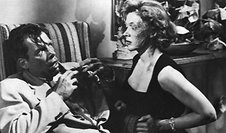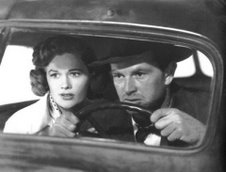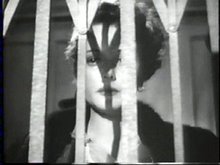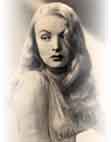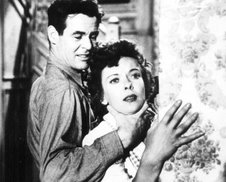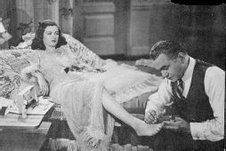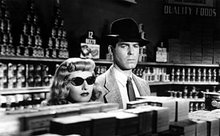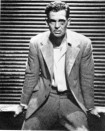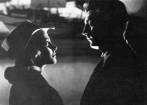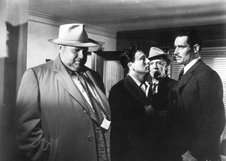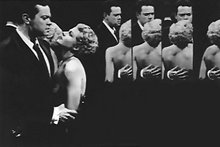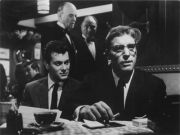




 Click Here
Click HereA page happily devoted to words of misery, depression, melancholy, alienation, bleakness, disillusionment, despair, desperation, cynicism, pessimism, ambiguity, moral corruption, evil, guilt, desperation, paranoia, and existentialism.

 Click below to hear noir superstar Richard Widmark define the genre. Noir one is better qualified to do it than the late actor, who graced some of the best noir films ever made, including KISS OF DEATH, NIGHT AND THE CITY, and PICKUP ON SOUTH STREET, and is mentioned many times on this page. www.lib.berkeley.edu/MRC/noir/media/noir.wav
Click below to hear noir superstar Richard Widmark define the genre. Noir one is better qualified to do it than the late actor, who graced some of the best noir films ever made, including KISS OF DEATH, NIGHT AND THE CITY, and PICKUP ON SOUTH STREET, and is mentioned many times on this page. www.lib.berkeley.edu/MRC/noir/media/noir.wav
 Hardy Cathcart (Clifton Webb): “How I detest the dawn. The grass always looks like it's been left out all night.”
Hardy Cathcart (Clifton Webb): “How I detest the dawn. The grass always looks like it's been left out all night.” Senator Morton (Leo G. Carroll): “Poor unfortunate girl.”
Senator Morton (Leo G. Carroll): “Poor unfortunate girl.” Packett (Berry Kroeger): "Honey, I'll make money like you want me to. Big money. But it takes time, you gotta give me time."
Packett (Berry Kroeger): "Honey, I'll make money like you want me to. Big money. But it takes time, you gotta give me time." Veda Pierce (Ann Blyth) to her mother Mildred (Joan Crawford): "You think just because you made a little money you can get a new hairdo and some expensive clothes and turn yourself into a lady. But you can't, because you'll never be anything but a common frump whose father lived over a grocery store and whose mother took in washing."
Veda Pierce (Ann Blyth) to her mother Mildred (Joan Crawford): "You think just because you made a little money you can get a new hairdo and some expensive clothes and turn yourself into a lady. But you can't, because you'll never be anything but a common frump whose father lived over a grocery store and whose mother took in washing." Doctor: “Ever see any botched plastic jobs? If a man like me didn't like a fellow... he could surely fix him up for life. Make him look like a bulldog, or a monkey. I'll make you look as if you've lived.”
Doctor: “Ever see any botched plastic jobs? If a man like me didn't like a fellow... he could surely fix him up for life. Make him look like a bulldog, or a monkey. I'll make you look as if you've lived.” Mr. Brown (Richard Conte), preparing to torture Diamond: “I think Mr. Diamond needs a drink. Got any liquor?”
Mr. Brown (Richard Conte), preparing to torture Diamond: “I think Mr. Diamond needs a drink. Got any liquor?” Roger Wade (Sterling Hayden): "Tell you what we're gonna do, Marlboro. You're gonna take that goddamn J.C. Penney tie off and we're gonna have an old fashioned man to man drinking party."
Roger Wade (Sterling Hayden): "Tell you what we're gonna do, Marlboro. You're gonna take that goddamn J.C. Penney tie off and we're gonna have an old fashioned man to man drinking party." Vivian (Lauren Bacall), not talking about horses: “Speaking of horses, I like to play them myself. But I like to see them work out a little first, see if they're front runners or come from behind, find out what their whole card is, what makes them run.”
Vivian (Lauren Bacall), not talking about horses: “Speaking of horses, I like to play them myself. But I like to see them work out a little first, see if they're front runners or come from behind, find out what their whole card is, what makes them run.” Opening narration (by Joseph Cotton or Carol Reed, depending on version): “I never knew the old Vienna before the war with its Strauss music, its glamour and easy charm. Constantinople suited me better. I really got to know it in the classic period of the black market. We'd run anything if people wanted it enough and whom had the money to pay. Of course a situation like that does tempt amateurs but, well, umm, you know they can't stay the course like a professional. Now the city is divided into four zones, you know, each occupied by a power: the American, the British, the Russian and the French. But the centre of the city that's international policed by an international patrol. One member of each of the four powers. Wonderful! What a hope they had! All strangers to the place and none of them could speak the same language. Except a sort of smattering of German. Good fellows on the whole, did their best you know. Vienna doesn't really look any worse than a lot of other European cities. Bombed about a bit. Oh, I was going to tell you, wait, I was going to tell you about Holly Martins, an American. Came all the way here to visit a friend of his. The name was Lime, Harry Lime. Now Martins was broke and Lime had offered him, some sort, I don't know, some sort of job. Anyway, there he was, poor chap. Happy as a lark and without a cent."
Opening narration (by Joseph Cotton or Carol Reed, depending on version): “I never knew the old Vienna before the war with its Strauss music, its glamour and easy charm. Constantinople suited me better. I really got to know it in the classic period of the black market. We'd run anything if people wanted it enough and whom had the money to pay. Of course a situation like that does tempt amateurs but, well, umm, you know they can't stay the course like a professional. Now the city is divided into four zones, you know, each occupied by a power: the American, the British, the Russian and the French. But the centre of the city that's international policed by an international patrol. One member of each of the four powers. Wonderful! What a hope they had! All strangers to the place and none of them could speak the same language. Except a sort of smattering of German. Good fellows on the whole, did their best you know. Vienna doesn't really look any worse than a lot of other European cities. Bombed about a bit. Oh, I was going to tell you, wait, I was going to tell you about Holly Martins, an American. Came all the way here to visit a friend of his. The name was Lime, Harry Lime. Now Martins was broke and Lime had offered him, some sort, I don't know, some sort of job. Anyway, there he was, poor chap. Happy as a lark and without a cent."Major Calloway (Trevor Howard): “That sounds like a cheap novelette.”
Holly Martins (Joseph Cotten): “Well, I write cheap novelettes.”
 Phyllis Dietrichson (Barbara Stanwyck), at their first meeting: "There's a speed limit in this state, Mr. Neff. Forty-five miles an hour."
Phyllis Dietrichson (Barbara Stanwyck), at their first meeting: "There's a speed limit in this state, Mr. Neff. Forty-five miles an hour." Wilmer Cook (Elisha Cook, Jr.): "Keep on riding me, Spade, and they're gonna be picking iron out of your liver."
Wilmer Cook (Elisha Cook, Jr.): "Keep on riding me, Spade, and they're gonna be picking iron out of your liver."Cop, picking up the falcon: “Heavy. What is it?”
Spade: “The, uh, stuff that dreams are made of.”
 Rick Blaine (Humphrey Bogart): "I came to
Rick Blaine (Humphrey Bogart): "I came to Maj. Strasser (Conrad Veidt): "Are you one of those people who cannot imagine the Germans in their beloved
Rick: "It's not particularly my beloved
Strasser: "Can you imagine us in
Rick: "When you get there, ask me."
Strasser: "How about
Rick: "Well there are certain sections of
Rick: "If I gave you any thought I probably would."
 Halliday (Robert Mitchum): “I don’t usually make it a habit to butt into women’s affairs, but what’s this guy Fisk to you?”
Halliday (Robert Mitchum): “I don’t usually make it a habit to butt into women’s affairs, but what’s this guy Fisk to you?” Dark rooms with sunlight slicing through Venetian blinds, alleyways littered with garbage, abandoned warehouses where dust fogs the air, rain-slickened streets, seedy detective offices overlooking bustling streets, and cigarettes, always cigarettes: this is the stuff film noir is made of – a perfect blend of form and content, where the desperation and hopelessness of the situations is reflected in a visual style that drenches the world in shadows and only occasional bursts of sunlight. Occasionally acerbic, usually cynical, film noir gives us characters forever trying to elude some mysterious past that continues to haunt them, hunting them down with a fatalism that teases and taunts before delivering the final blow.
Dark rooms with sunlight slicing through Venetian blinds, alleyways littered with garbage, abandoned warehouses where dust fogs the air, rain-slickened streets, seedy detective offices overlooking bustling streets, and cigarettes, always cigarettes: this is the stuff film noir is made of – a perfect blend of form and content, where the desperation and hopelessness of the situations is reflected in a visual style that drenches the world in shadows and only occasional bursts of sunlight. Occasionally acerbic, usually cynical, film noir gives us characters forever trying to elude some mysterious past that continues to haunt them, hunting them down with a fatalism that teases and taunts before delivering the final blow. Cody Jarrett (James Cagney), while eating a chicken leg, to Parker in the trunk of the sedan:
Cody Jarrett (James Cagney), while eating a chicken leg, to Parker in the trunk of the sedan: Rigby Reardon (Steve Martin): "Carlotta was the kind of town where they spell trouble T-R-U-B-I-L, and if you try to correct them, they kill you."
Rigby Reardon (Steve Martin): "Carlotta was the kind of town where they spell trouble T-R-U-B-I-L, and if you try to correct them, they kill you." Jeff Bailey (Robert Mitchum): “I sell gasoline, I make a small profit. With that I buy groceries. The grocer makes a profit. We call it earning a living. You may have heard of it somewhere.”
Jeff Bailey (Robert Mitchum): “I sell gasoline, I make a small profit. With that I buy groceries. The grocer makes a profit. We call it earning a living. You may have heard of it somewhere.”




